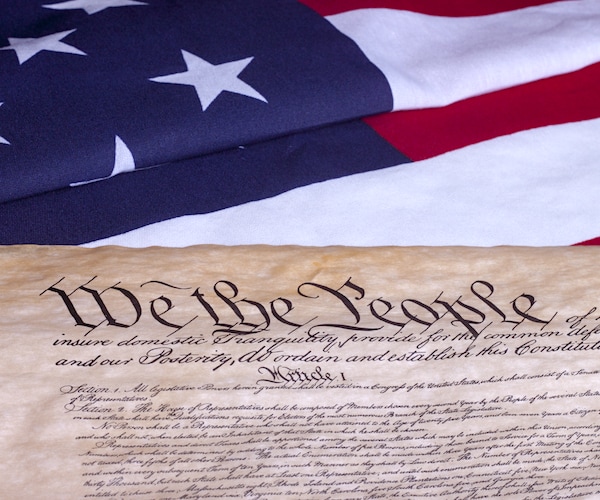[ad_1]
Let’s face it: whatever side of the spectrum one is on, he or she will conclude that progressive, critical historians have sought to undermine the foundational principles that formed our nation.
To a great degree, they have succeeded.
The true understanding of the Constitution and the framers who wrote it have largely been forgotten, or even rejected by most American academics.
The proof therein is that many schools have eschewed even the basic teaching of American history from an objective point of view.
Tim Goeglein’s new book, “Toward a More Perfect Union: The Moral and Cultural Case for Teaching the Great American Story,” fights back against the left’s years-old attack on the history and values that made America one nation under God.
Goeglein, a former White House aide to George W. Bush and now head of the Washington, D.C. office of Focus on the Family, highlights the sad truth that many Americans have opted to not seriously consider their own history.
The sad conclusion that “ignorance is bliss” is squared against the harsh admonition of George Santayana: “Those who cannot remember the past are condemned to repeat it.”
Simply put, Goeglein’s thesis is that our culture and our institutions have been hijacked by a dogmatic devotion to destroying the history that previous generations of Americans had once taken for granted.
Most recently, many institutions — academic and political — have eroded the past by using “cancel culture” or simply rewriting history to fit their narrative that America is “racist,” perhaps “irredeemable,” or even “deplorable.”
But where did the long march toward destroying American history begin? Goeglein pinpoints that the late historian Howard Zinn was “the godfather of the radical attack on America’s history and heritage.” He also points out that Zinn’s true objective was “to invert all the power structures of America, past and present, a task requiring him to defame the Founders and many other American leaders and institutions as well as upend the social and moral foundations of our country.”
Goeglein’s use of quoting Zinn’s works makes a compelling case that modern progressive attacks on the founding, such as the tenets of critical race theory and the mission of the 1619 Project, can be traced back to Zinn’s original writings.
Zinn’s motto that “you cannot be neutral on a moving train” — meaning that everyone
eventually has to take a side in this culture war — crystallized the urgency of how quickly the American experiment can derail when people choose to be ‘neutral’ or apathetic.
Although it is true that the ideas Zinn espouses actually predate him — notably, the Marxist rendition of the American founding in Charles Beard’s “An Economic Interpretation of the Constitution of the United States (1913)” — the historian made formerly esoteric theories such as these mainstream and popular within American society and its institutions.
Indeed, American conservatives have a great task ahead in converting their countrymen back to a more historical and objective view of history.
Goeglein’s method for reversing our country’s course is not simply to educate our own children on the history and values of our country. We must also become active in the fight to preserve our nation’s traditions.
According to the author, two bills — the “Civics Learning Act of 2021” and the “Civics Secures Democracy Act” — recently introduced in Congress would essentially turn our schools into indoctrination centers. (Not that they haven’t become that already, many will demonstrate.) The former’s official bill summary describes its purpose as: “expand[ing] the use of American History and Civics Education — National Activities Grants — to prioritize innovative civics learning and teaching.”
This learning is accomplished by expanding the “allowable uses of these grants to include before-, during-, and after-school activities and extracurricular activities.” These include, “service learning and community service projects that are linked to school curriculum; activities that encourage and support student participation in school governance; and online and video game-based learning.”
However, Goeglein references John Sailer, senior fellow of the National Association of Scholars, who states, “This bill is nothing more than an attempt to turn students into professional protesters,” by allowing them to engage in taxpayer-funded “so-called action civics.”
The second bill, the “Civics Secures Democracy Act” (CSDA), would provide “resources to expand educational programs in American civics and history, including by establishing grant and fellowship programs, reauthorizing various programs, and creating the Civics Secures Democracy Fund.”
Notably, the CSDA amends section 805 of the Higher Education Act of 1965 by changing the program entitled “American History for Freedom” to “Civics and History Education Program.”
What does this mean? One finds out by discovering that the CSDA further amends the program “in paragraph (2), by striking ‘traditional American history, free institutions, or Western civilization’ and inserting ‘American political thought and history, free institutions, the impact of American representative democracy and constitutional democracies globally, or the means of participation in political and civic life.'”
Goeglein concludes that this bill provides “a radically progressive national civics curriculum, complete with state standards by which schools will be judged.”
In short, “Toward A More Perfect Union” serves as a call to action to recover our nation’s rich history through advocacy and education.
In laying out the case of what challenges the traditional teaching of history, “Toward A More Perfect Union” presents the need to be able to question the forces that could easily tear down the history that has held our nation together, through wars both foreign and domestic, over the span of nearly 250 years.
By reading Goeglein’s book, the reader is actually challenged to understand what it means to be an American. It also assists the reader to rediscover that meaning and address why it is such a sacrosanct gift.
Michael Cozzi is studying law at the Columbus School of Law at The Catholic University of America.
